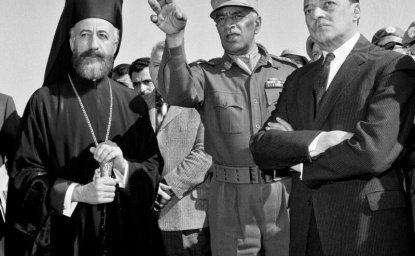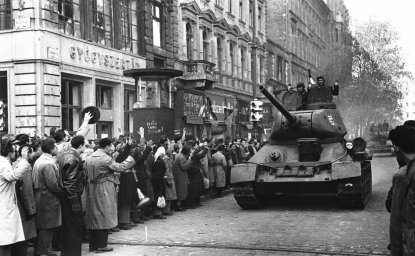Reported by Mary-Lea Cox
Newly released Russian documents from the time of JFK's assassination show that the Soviet government tried to distance itself from Lee Harvey Oswald and feared being tagged with responsibility for the president's murder, concluded a panel of experts at a Center press briefing on August 5.
The papers were given by President Yeltsin to President Clinton and are being analyzed by the Center's Cold War and International History Project (CWIHP).
In one sense, Oswald would have made an ideal ally of the Soviet government. He was the rare American to defect to the Soviet Union, applying for citizenship in 1959. He also lived in Minsk, Russia, for a time, taking a Russian wife and professing a willingness to reveal state secrets to the Soviets.
But, far from embracing Oswald or wishing to use him for intelligence, the Soviet government distrusted his motives (suspecting he might be a spy) and, several years prior to the assassination, had been assembling a dossier on Oswald, including evidence to show that he was mentally unstable. Then, when Oswald was apprehended as Kennedy's assassin, they resented the American media's attempts to link him to a Soviet conspiracy. The new evidence corroborates findings from memoirs published by key figures and other studies of the JFK assassination period, concluded the panel.
The panel were assessing the approximately 40 documents that Russian President Yeltsin handed over to President Clinton at their recent economic summit in Cologne, Germany, including:
* a handwritten 16 October 1959 letter by Lee Harvey Oswald requesting to be granted Soviet citizenship: "I want citizenship because I am a communist and a worker; I have lived in a decadent capitalist society where the workers are slaves..."
* Soviet envoy Anastas Mikoyan's emotional cable on his meeting with Jacqueline Kennedy at the funeral
* a handwritten letter from Jacqueline Kennedy to Soviet leader Nikita Khrushchev, dated December 1, 1963, in which Mrs. Kennedy emphasized "how much my husband was concerned about peace and how important the relations between you and him were to him in this concern."
The briefing was arranged by the Cold War Project, which is to deliver the first scholarly assessment of the papers in addition to publishing the complete set (in translation) in its next CWIHP Bulletin, due in early October.
Completing the puzzleThe panelists mentioned that several recent works on the JFK period -- such as the memoirs of USSR ambassador Anatoly Dobrynin and Norman Mailer's book on Oswald -- have established the Soviets' wish to distance themselves from Oswald, particularly after he assassinated Kennedy. Also, some of the newly released material, such as the letter from Jacqueline Kennedy to Nikita Khrushchev, had already found its way into the public domain; this particular letter, for instance, was published in William Manchester's Death of a President (1967).
But the latest documents are especially important, the panelists said, because they provide a "better, deeper sense" of the Soviets' unease with Oswald and their concern to protect their relationship with the U.S. in the days following the assassination. As Timothy Naftali put it, "Oswald pushed a lot of hot buttons there [in the Soviet Union] as here." The papers further attest, Naftali said, to the "bureaucratic scrambling" that led to Moscow's failure to take advantage of Oswald's willingness to gather intelligence on the Soviets' behalf.Also worth noting, said Vladislav Zubok, was the warm tone of the letter Jacqueline Kennedy sent to Nikita Khrushchev one week after her husband was assassinated, suggesting the "specialness" of her relationship with the Russian leader. "You and he were adversaries," Mrs. Kennedy wrote to Khrushchev, "but you were also allies in your determination not to let the world be blown up."
The memory of the Cuban missile crisis was still fresh in everyone's minds, Zubok explained, and neither Mrs. Kennedy nor Khrushchev wanted Oswald's connections to the Soviet Union to become the pretext for another showdown between the two superpowers. In those highly emotional days following the assassination, even Lyndon Johnson, Kennedy's successor, believed the Soviets might have been behind Oswald's action. That Mrs. Kennedy did not succumb to this way of thinking is striking, Zubok proclaimed.
Likewise, he added, the exchange of letters between American Secretary of State Dean Rusk and Soviet ambassador Anatoly Dobrynin following the shooting make clear the "confidentiality" the two men enjoyed in their relationship as well as the lengths they would go to avoid the potentially "bad effect" of emphasizing Lee Harvey Oswald's contacts with the Soviet Union. The documents further show that Rusk's missives helped to assuage Soviet fears that allegations of Soviet complicity in Kennedy's death would damage their relationship with the United States.
Just the beginning?All four panelists admitted that seeing these papers had only whetted their taste for more. Naftali, who had served as a consultant to the Assassination Records Review Board, explained that the board had sent a letter asking for the release of the six volumes of Soviet records on Oswald; but it was not clear whether Yeltsin's latest "archival diplomacy" was a response to that letter or a personal gesture to Clinton, "since Yeltsin knows of Clinton's fascination with JFK."
Yeltsin has selectively released historical documents on other occasions, such as in early and mid-1990s when he brought top secret Politburo documents on the 1956 Soviet invasion of Hungary to Budapest and provided the South Korean government with high-level Soviet documents on the Korean War and flight KAL 007. But this is the first time he has made a set of important historical papers available to the United States.
Raymond Garthoff said he would like to see the materials (if such exist) on the "routine monitoring" of Oswald and his wife, Marina, during the three years they were living in Minsk. Max Holland agreed, adding that the Soviets kept a large case file on Oswald. Moreover, there are many other associated documents researchers would appreciate seeing, such as the KGB's December 1963 analysis of the assassination, and any records about conversations between Moscow and Havana after Lee Harvey Oswald's arrest.
Besides the missing items mentioned by the other panelists, Naftali said he would like to see papers on Oswald's visit to the Soviet authorities in Mexico City, and of the "special files" -- materials available to the Kremlin when they made their decisions. Since the Soviet Union's government was so centralized, special files can be very revealing of its decisionmaking process, Naftali explained.
The briefing ended with Naftali expressing the hope that the federal panel reviewing the JFK assassination will reissue its letter petitioning the Russian government for a full release of the KGB's Oswald dossier and all other documents related to the assassination.

Cold War International History Project
The Cold War International History Project supports the full and prompt release of historical materials by governments on all sides of the Cold War. Read more




